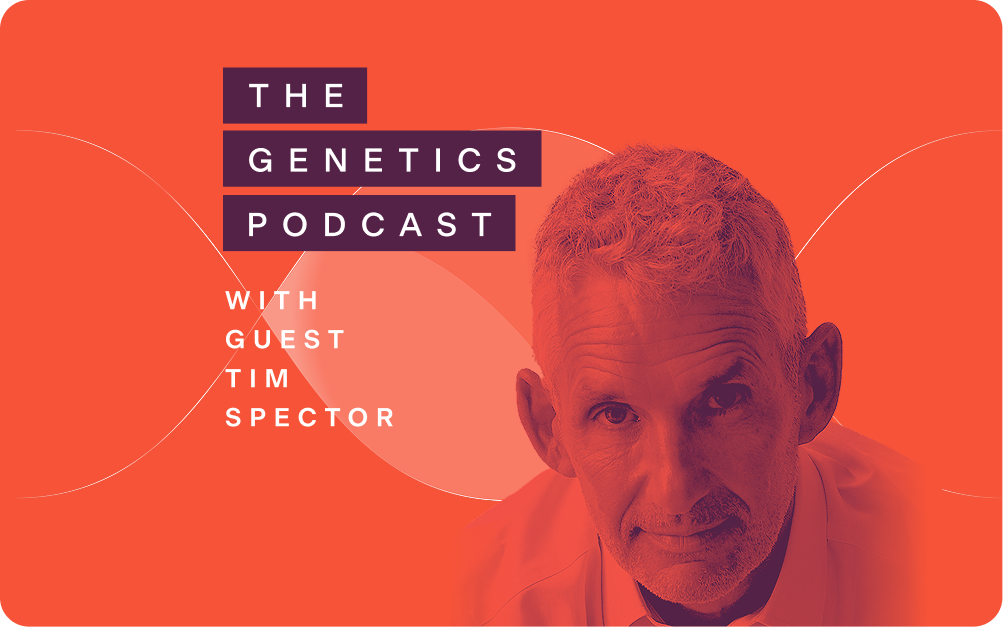Podcast recap: Tim Spector on twin research, microbiome breakthroughs, and why diet is the key to personalized health

On a recent episode of The Genetics Podcast, Patrick spoke with Tim Spector, Professor of Genetic Epidemiology at King’s College London and co-founder of Zoe. They discuss surprising insights on heritability from decades of twin research, the profound impact of the microbiome on health and disease, and the effect of diet on the gut microbiome.
Tim’s career path from rheumatologist to geneticist
Tim started his medical career as a rheumatologist and subsequently started doing research on epidemiology, which sparked his interest in population-based genetics. He noticed a gap in twin studies in the UK particularly, and established one to study rheumatological disease initially and later expanded it to investigate countless traits and disease risk. These included everything from political ideology to right-handedness to sexuality. Interestingly, Tim also shared the surprising observation that back pain is three times more heritable than breast cancer.
With the development of genome-wide association studies (GWAS), Tim’s research began to uncover the polygenic nature of some traits and diseases. He subsequently looked at epigenetics as an additional layer of information. A new era in his academic career began when he became interested in the microbiome in 2009.
The profound impact of the microbiome on health
Tim’s introduction to the microbiome came after a talk about how Helicobacter pylori could revolutionize ulcer treatment. This made him think about the microbiome in twins, eventually leading to a twin study examining the gut microbiome using early 16S sequencing a few years later. The results were startling: while most biological traits in twins show strong heritability, the gut microbiome did not. There was far more variation between individuals than between identical and non-identical twins.
This finding led Tim to hypothesize that the microbiome could be a major driver of individual differences in health, even among genetically identical people. Over the years, he and his collaborators have built a robust body of research showing that the microbiome affects everything from immune response to mood, inflammation, metabolic function, and even drug metabolism. Immune cells residing in the gut constantly interact with microbes, and this connection may help explain links between the microbiome and conditions like autoimmune disease, depression, and cancer.
The dynamic flux of the microbiome
The microbiome can change significantly based on diet, medication, or environment. Tim emphasized the need for serial measurements and longitudinal studies to fully understand cause and effect. While therapies like fecal transplants did not live up to expectations, newer approaches like smart capsules for gut sampling and microbiome metabolite analysis offer promise.
Tim argued that the future lies in understanding the function of microbial communities, like what chemicals they produce and how those affect the host, rather than fixating on specific species. He likens the current moment in microbiome research to the early GWAS era: with larger datasets and better tools, clear patterns are finally emerging from the complexity.
One striking example is a microbe his team identified that thrives exclusively in coffee drinkers. With data from over 250,000 individuals, they can now identify microbial responses not only to coffee, but to nuts, seeds, broccoli, and countless other dietary components. This brings the field closer to truly individualized nutrition based on how a person’s microbiome is likely to respond to specific foods.
Another key shift in thinking has been the move from “eliminating bad bugs” to “nurturing good ones.” Instead of trying to wipe out pro-inflammatory or pathogenic species, the focus should be on building a resilient, diverse ecosystem of beneficial microbes.
The effect of the microbiome on drug efficacy and disease risk
Tim also discussed how microbiome composition can affect drug efficacy. Some microbes deactivate drugs like acetaminophen or antidepressants, while others influence cancer immunotherapy response. Tim’s group even found that individuals with healthier microbiomes at the start of immunotherapy were more likely to survive advanced melanoma.
There's also potential for disease detection, as specific microbes appear to act as early biomarkers. For example, Fusobacterium nucleatum has been linked to colon cancer risk up to a decade before diagnosis. In the future, stool testing could become a low-cost, high-impact screening tool for a range of diseases.
Still, significant barriers remain. Despite promising science, the microbiome lacks a “home” in traditional medicine. It doesn’t fall neatly under microbiology, gastroenterology, or genetics. As a result, it’s often excluded from major biobank studies and funding schemes. For now, much of the innovation continues outside traditional clinical research, with help from consumer engagement and startups like Zoe.
Promoting microbiome health with Zoe
Tim co-founded Zoe to help bring the power of microbiome research to individuals. Its at-home testing kits and app-based tools empower users to understand their unique microbiome profile and dietary responses.
Tim hinted at more to come: a cookbook translating microbiome science into 100 gut-friendly recipes, a free food-scanning app to assess ultra-processed food risk, and Zoe’s continued product evolution, including Daily 30, a freeze-dried prebiotic blend shown to enhance 40 of the top 100 beneficial microbes in just weeks.
Listen to the full episode below.
